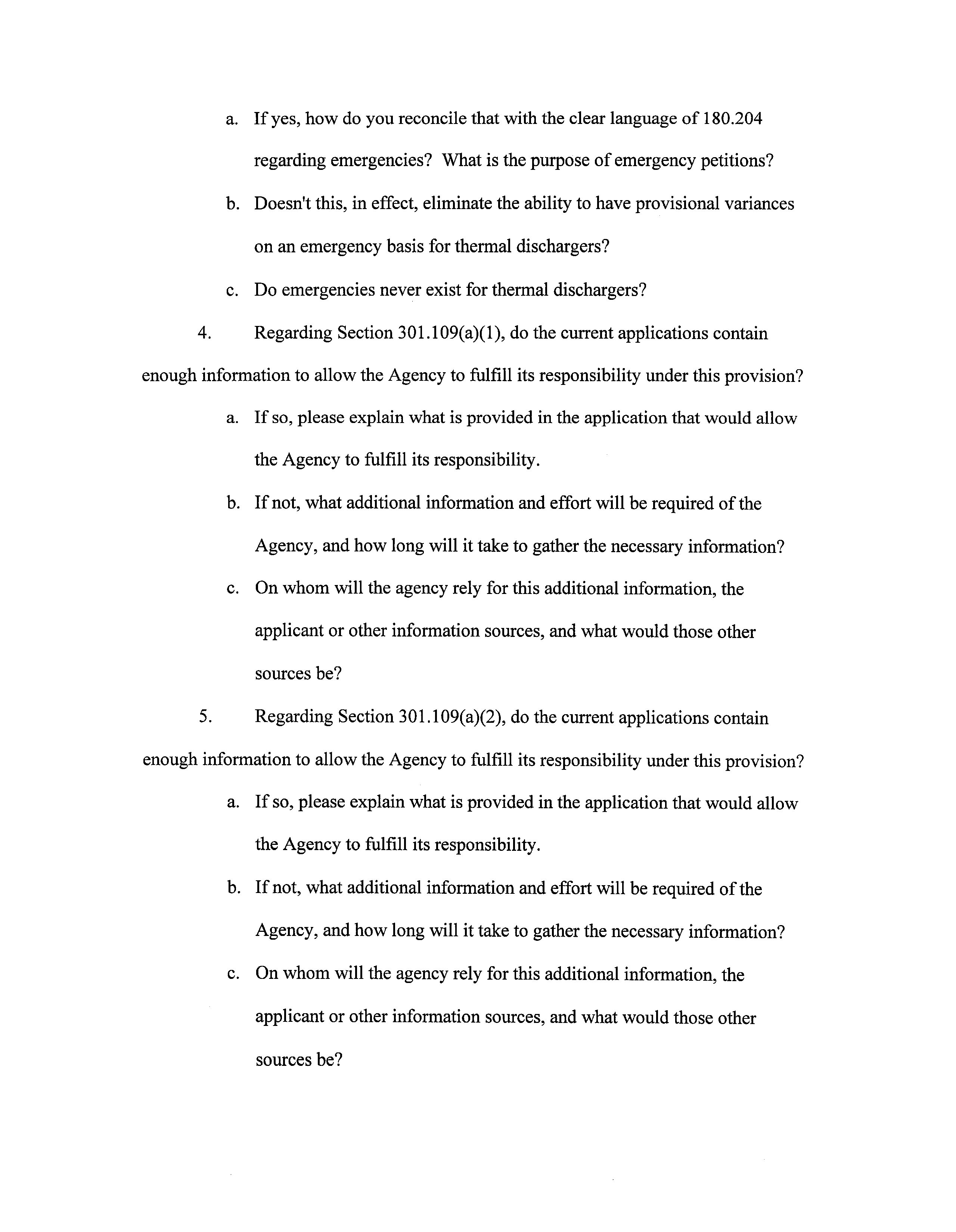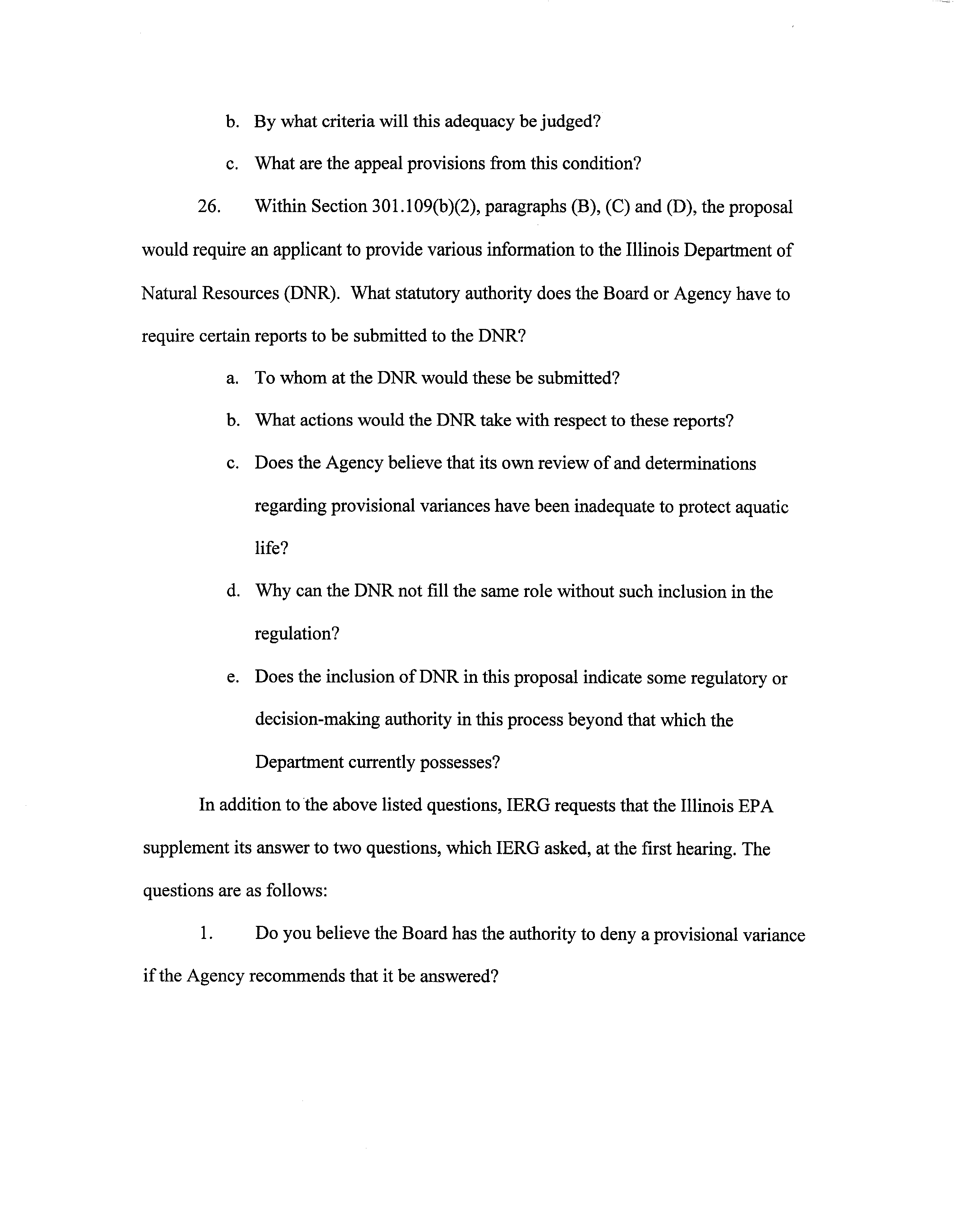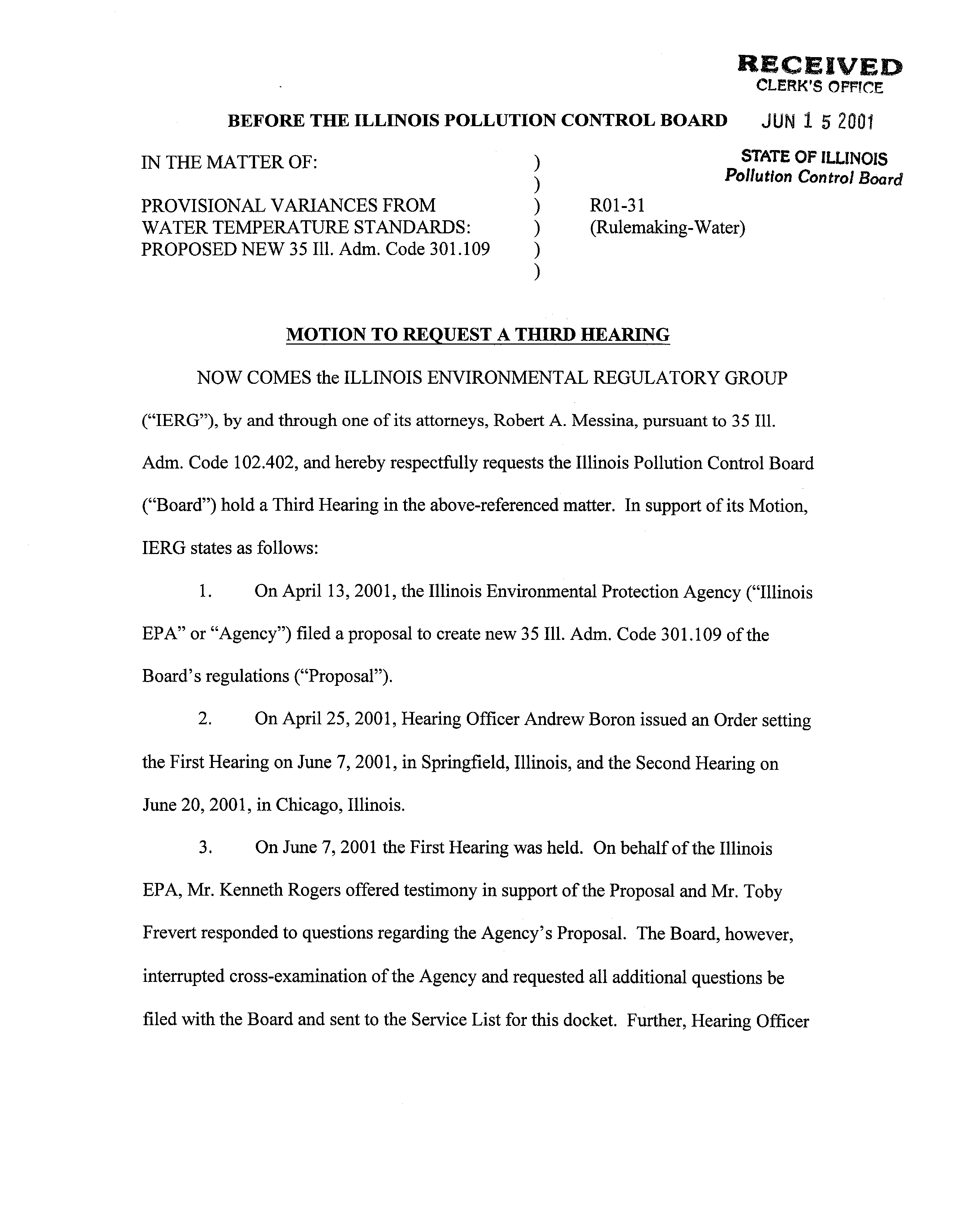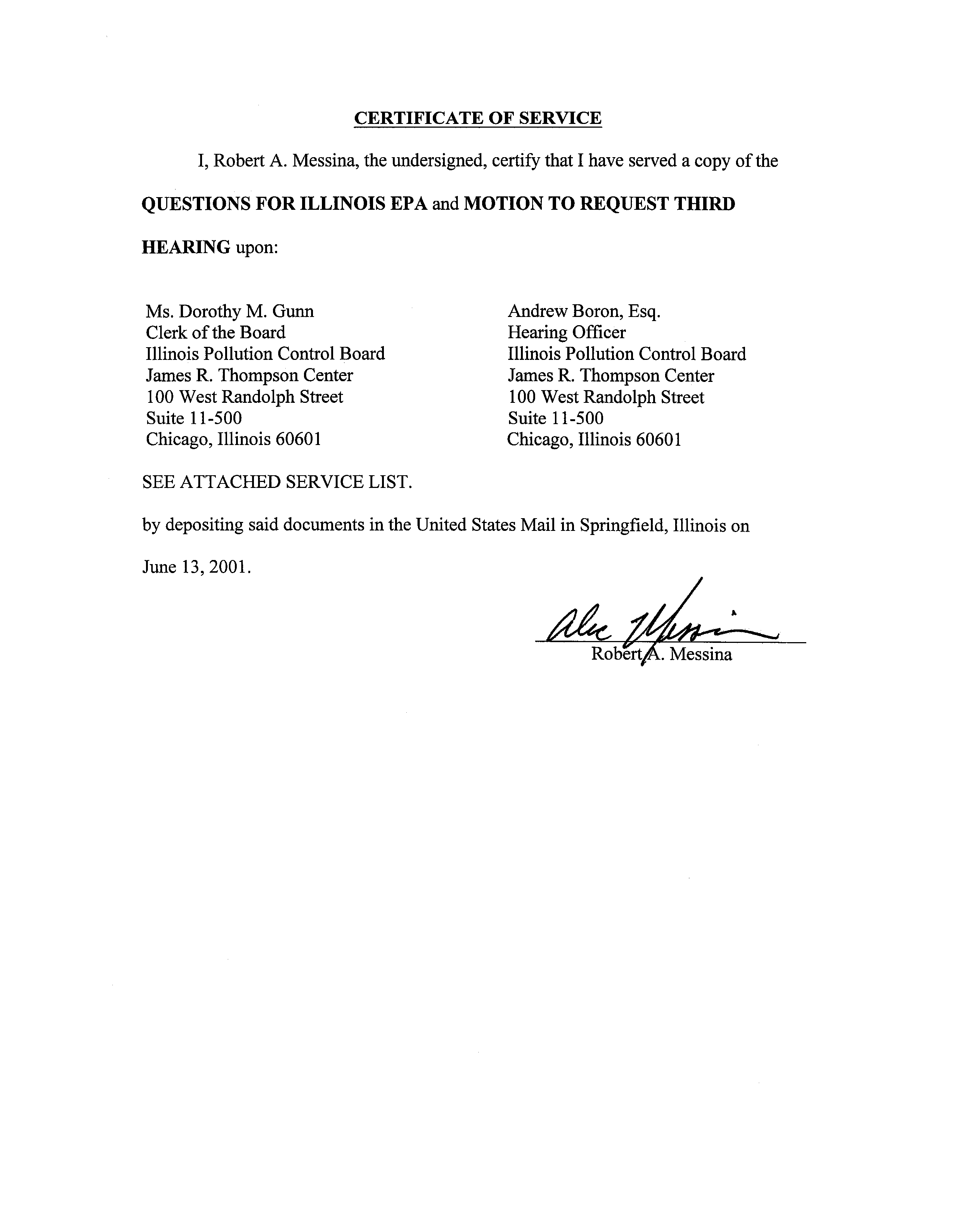RECEIVED
CLERK’S
OFflCE
JUN
1.
5
2001
STATE OF ILLINOIS
Pollution
Control Board
ILLINOI
IN THE MATTER OF:
PROVISIONAL VARIANCES FROM
WATER TEMPERATURE STANDARDS:
PROPOSED NEW 35111. Adm. Code
301. 109
)
)
)
)
RO1-31
(Rulemaking
-
Water)
)
)
NOTICE OF FILING
TO:
Ms. Dorothy M. Gunn
Clerk ofthe Board
Illinois Pollution Control Board
James R. Thompson Center
100 West Randolph Street
Suite 11-500
Chicago, Illinois 60601
(VIA FIRST CLASS MAIL)
Andrew Boron, Esq.
Hearing Officer
Illinois
Pollution Control Board
James R.
Thompson Center
100 West Randolph Street
Suite 11-500
Chicago, Illinois
60601
(VIA FIRST CLASS MAIL)
(PERSONS ON ATTACHED SERVICE LIST)
PLEASE TAKE NOTICE that I have filed today with the Clerk ofthe Illinois
Pollution Control Board an original and nine copies of the QUESTIONS
FOR
ILLINOIS EPA
and
MOTION TO REQUEST THIRD
HEARING, copies ofwhich
are herewith served upon you.
Respectfully submitted,
ILLINOIS ENVIRONMENTAL
REGULATORY GROUP,
By:
One ofIts
omeys
Dated: June
13, 2001
Robert A. Messina
Illinois Environmental
Regulatory Group
215
East Adams Street
Springfield, Illinois 62701
(217) 522-5512
THIS FILING SUBMITTED ON RECYCLED PAPER
RECEIVED
BEFORE THE ILLINOIS POLLUTION CONTROL BOARD
CLERK’S OFP!CE
JUN
1
5
2001
IN THE MATTER OF:
)
)
STATE OF ILLINOIS
PROVISIONAL VARIANCES FROM
)
ROl-31
Pollution
ControlBoard
WATER TEMPERATURE STANDARDS:
)
(Rulemaking-Water)
PROPOSED NEW
35 Ill.
Adm. Code 301.109
)
)
QUESTIONS FOR ILLINOIS EPA
NOW COMES the ILLINOIS ENVIRONMENTAL REGULATORY GROUP
(“IERG”),by and through one of its attorneys, Robert A. Messina, pursuant to the Illinois
Pollution Control Board’s(“Board”)request at its June 7, 2001, hearing, and hereby
respectfully submits to the Board its
additional questions ofthe Illinois Environmental
Protection Agency (Illinois EPA).
The questions are as follows:
1.
Regarding Section 301.109(a), what is the rationale for including the
contents of the “application”in the Agency recommendation?
a.
Is this “inclusion” in addition to a discussionofthe items in 301.109
(a)(l), (2),
and (3)?
b.
Or,
is itjust that the information included in the application will be
used to
prepare paragraphs (a)(1)-(3) in the Agency’s recommendation?
2.
What “other rules” are the Agency referring to when it refersto water
temperature standards “set forth in 35 Ill. Adm.
Code 302.211
or 303
or any other rule?”
3.
Does the Agency believe that all ofthe 180.202(b) information should be
required even in those instances when an applicant submits a provisional variance
application pursuant to the emergency provisions contained in Section 180.204?
a.
Ifyes, how do you reconcile that with the clear language of 180.204
regarding emergencies?
What is the purpose of emergency petitions?
b.
Doesn’tthis, in effect, eliminate the ability to have provisional variances
on an emergency basis for thermal dischargers?
c.
Do emergencies never exist for thermal dischargers?
4.
Regarding Section 301.1 09(a)(1), do the current applications contain
enough information to allow the Agency to fulfill its responsibility under this provision?
a.
If so, please explain what is provided in the application that would allow
the Agency to fulfill its
responsibility.
b.
Ifnot, what additional information and effort will be required ofthe
Agency, and how long will it take to gather the necessary information?
c.
On whom will the agency rely for this additional information, the
applicant or other information sources, and what would those other
sources be?
5.
Regarding Section
301. 109(a)(2), do the current applications contain
enough information to allow the Agency to fulfill its responsibility under this provision?
a.
Ifso, please explain what is provided in the application that would allow
the Agency to fulfill its responsibility.
b.
If not, what additional information and effort will be required of the
Agency, and how long will it take to gather the necessary information?
c.
On whom will the agency rely for this additional information, the
applicant or other information sources, and what would those other
sources be?
6.
How does the Agency plan to make a forseeability determination?
a.
Ifthe weather conditions during the summer of 1999 were to repeat
themselves tomorrow, would those conditions be reasonably foreseeable?
b.
How, in the Agency’sview,
does foreseeability relate to arbitrary or
unreasonable hardship?
c.
Would the proposed rules have the effect of providing a basis for denying
a provisional variance request based on the Agency’s determination that
the weather conditions were “reasonably foreseeable?”
7.
Regarding Section 301.1 09(a)(3), why has the Agency included a
provision seeking information regarding five year historical data?
a.
Is this datato be a determinant in the granting or denial ofa provisional
variance?
b.
Ifso, what is the statutory basis for this type of restriction?
8.
Regarding Section
301 .109(b)(2), is it the intent ofthis proposal to
require
that the Agency recommendthe imposition ofall ofthe listed conditions on every
provisional variance unless the Agency justifies otherwise? Ifso,
a.
Please discuss why each condition should be
applied in all cases.
b.
Please explain why the language requires the Agency to explain what
actions it did not take rather than the actions it did take.
c.
Can the Agency identify any
other case in which it is required to defend an
action that it did not take (in the context ofan approval; not a permit
denial)?
9.
imposed in
10.
monitoring
d.
Why is it not appropriate to reverse the language to explain why a
condition was
added rather than why it was not added?
e.
What level ofjustification must the Agency provide when recommending
that a specific condition not be imposed?
f.
Must the Board accept that level ofjustification?
Regarding Section 301.109(b)(2)(A), is this a condition that is currently
thermal provisional variances?
Please explain the need for, and feasibility of, requiring continuous
ofthe receiving water.
a.
Is this currently being done by all potentially affected facilities?
b.
If not, what type offacilities currently do so?
c.
What would be the cost and feasibility of adding such monitoring for a
provisional variance if it is not currently undertaken by the facility?
11.
What is the need for inspection of the intake area?
12.
What does the Agency intend by requiring inspections three times daily?
a.
Will this require nighttime inspections?
b.
What level ofeffort would be required at such inspections to determine
mortality?
13.
Regarding Section 301.109(b)(2)(B), is this a condition that
is currently
imposed in thermal provisional variances?
14.
Please explain what the Agency means by “document environmental
conditions.”
a.
What level
and types ofactivities
are expected?
15.
What actions will the Agency take to
assess the adequacy ofthe
information submitted?
a.
What occurs if the Agency (or the Board) is not satisfied with the
submittal?
b.
Can either the Agency or the Board request additional information?
c.
What, if any, appeal rights are anticipated?
16.
Regarding Section 301.109(b)(2)(C), is this a condition that
is currently
imposed in thermal provisional variances?
17.
Please explain what the Agency means by “immediately implement.”
18.
Please explain what the Agency means by “biological activities.”
a.
Would they vary among different habitats and different situations?
b.
What types ofplans would an applicant have to submit to demonstrate that
it was prepared to “implementbiological activities?”
c.
What type of review would the Agency need to determine whetherthe
plans are adequate?
d.
Can this be done within the context ofthe time frame for a provisional
variance?
Ofan emergency provisional variance?
19.
This provision requires the applicant to “characterize how aquatic life
respondls] to the thermal conditions.”
What will the characterization be compared to?
a.
How will this response to thermal conditions be measured?
b.
How would this requirement differ from the requirements contained in
Section
301 .109(b)(2)(A)?
c.
Please comment on the feasibility ofundertaking such an effort within the
time frame ofa provisional variance.
20.
Regarding Section
301 .109(b)(2)(D), is this a condition that
is currently
imposed in thermal provisional variances?
21.
Please explain and give examples ofwhat the Agency means by “unusual
conditions.”
22.
Will the applicant be requiredto remedy problems even if the provisional
variance does not cause the problem?
a.
Is there any presumption in the proposed rules that any “unusual
conditions” observed have been caused by the provisional variance
discharge unless proven otherwise?
b.
Will the discharger have the burden of proving a lack of causation in order
to be relieved ofan obligation to remedy the problem observed
in the
receiving water?
c.
Please expand on what type ofremedy the Agency envisions for specific
possible problems.
23.
This provision requires applicants to notify the Agency and DNR when
normal conditions return. What is the basis ofcomparison for determining normal
conditions?
24.
Regarding Section 301. 109(b)(2)(E), is this a condition that is currently
imposed in thermal provisional variances?
25.
Please explain from where the authority to require remediation is derived.
a.
Who will judge the adequacy ofthe remediation plan?
b.
By what criteria will this adequacy be judged?
c.
What are the appeal provisions from this condition?
26.
Within Section
301 .109(b)(2), paragraphs (B), (C) and
(D), the proposal
would require an applicant to provide various information to the Illinois Department of
Natural Resources (DNR).
What statutory authority
does the Board or Agency have to
require certain reports to be submitted to the DNR?
a.
To whom at the DNR would these be submitted?
b.
What actions would the DNR take with respect to these reports?
c.
Does the Agency believe that its
own review ofand determinations
regarding provisional variances have been inadequate to
protect aquatic
life?
d.
Why can the DNR not fill the same role without such inclusion in the
regulation?
e.
Does the inclusion ofDNR in this proposal indicate some
regulatory or
decision-making authority
in this process beyond that which the
Department currently possesses?
In addition to the above listed questions, IERG requests that the Illinois EPA
supplement its
answer to two questions, which IERG asked, at the first hearing. The
questions are as follows:
1.
Do you believe the Board has the authority to
deny a provisional variance
if the Agency recommends that it be answered?
2.
Ifthe Agency were to make a recommendation to the Board with
conditions, can the Board grant that provisional variance withoutthose conditions or with
different conditions, or is the Board bound by those conditions?
In the Illinois EPA’s answers to thesequestions
at hearing, Mr. Frevert suggested
that he would consult with the legal staff at the Agency and provide any corrections
(See
June 7,2001, Hearing Transcript, p. 20; and June 7,2001, Hearing Transcript, p.
22).
IERG believes that concise answers to these two questions
are necessary to allow our
Executive Director to adequately prepare for policy testimony at the July 20, 2001,
hearing.
WHEREFORE, IERG respectfully submits these questions to the Board and
requests the Illinois EPA respond.
Respectfully,
By:___
Robert A. I(4essina
Dated: June
13, 2001
Robert A. Messina
Illinois Environmental Regulatory Group
215
East Adams Street
Springfield, Illinois
62701
RECEIVED
CLERK’S op~rc~
BEFORE THE ILLINOIS POLLUTION CONTROL BOARD
JUN
1.
5
2001
IN THE MATTER OF:
)
STATE OF ILLINOIS
)
Pollution
Control Board
PROVISIONAL VARIANCES FROM
)
RO1-31
WATER TEMPERATURE STANDARDS:
)
(Rulemaking-Water)
PROPOSED NEW 35 Ill. Adm. Code 301.109
)
)
MOTION TO REQUEST A THIRD HEARING
NOW COMES the ILLINOISENVIRONMENTAL REGULATORY GROUP
(“IERG”).by and through one of its attorneys. Robert A. Messina, pursuant to 35
Ill.
Adm.
Code
102.402, and hereby respectfully requests the Illinois Pollution Control Board
(“Board”) hold a Third Hearing in the above-referenced matter. In support ofits Motion,
IERG states as follows:
1.
On April
13, 2001, the Illinois Environmental Protection Agency (“Illinois
EPA” or “Agency”) filed a proposalto
create new 35
Ill. Adm. Code 301.109 ofthe
Board’s regulations(“Proposal”).
2.
On April
25,
2001, Hearing Officer Andrew Boron issued
an Order setting
the First Hearing on June 7, 2001, in Springfield, Illinois, and the Second Hearing on
June 20, 2001, in Chicago, Illinois.
3.
On June 7, 2001
the First Hearing was held.
On behalfofthe Illinois
EPA,
Mr. Kenneth Rogers offered testimony in support ofthe Proposal and Mr. Toby
Frevert responded to questions regarding the Agency’sProposal.
The Board,
however,
interrupted cross-examination ofthe Agency and requested all additional questions
be
filed with the Board and sent to the Service List for this docket. Further, Hearing Officer
Boron indefinitely postponed the Second Hearing to accommodate both the filing of
additional questions and preparation of answers by the Illinois EPA.
4.
On June
12, 2001, IERG was notified by Hearing Officer Boron that the
Second Hearing will be scheduled for July 20, 2001, in Chicago, Illinois, with pre-filed
testimony to be received by the Board no later than July
13, 2001.
The mailbox rule will
not apply.
Further, Hearing Officer Boron indicated the Board intends to require the
Illinois EPA to submit its answers to filed questions by June 29, 2001.
5.
With this Motion, IERG is also
filing the “Questions for Illinois EPA,”
pursuant to the Board’srequest.
IERG also
intends to offer testimony at the Second
Hearing on IERG’s generalissues ofconcern, namely those issues upon which IERG was
able to cross-examine the Agency, regarding the Proposal.
However, the short time
frame involved between the deadline for the Agency to respond to filed questions and the
deadline for pre-filed testimony forthe Second Hearing will adversely affect IERG’s
ability, and particularly its member companies’ability, to
prepare a meaningful response
to the Agency’s answers to the filedquestions.
There will simply be insufficient time to
receive and review the Agency’s answers to thefiled questions, to brief IERG’s member
company representatives, to solicit their input, and to prepare detailed testimony in
response to the Agency’sanswers.
Also, IERG anticipates preparing proposed revisions
to the Proposal,
and preparing testimony in support ofthe
same.
6.
IERO is hereby requesting that the Board schedule a Third Hearing in this
matter forthe purpose ofproviding sufficient time to review the Illinois
s response
to
IERG’sfiled questions and to analyze their impact on IERG’s membercompanies.
Further, additional time will allow IERG to
offer more detailed testimony on our areas of
concern and in support ofproposed revisions to the Agency’sproposal.
7.
In addition,
there is not currently a deadline by which the Board is
required to adopt the regulations proposed in this rulemaking.
As such, no material
prejudice would result if the Board were to
grant this Motion, and hold a Third Hearing
in this matter.
8.
Further, because this proposal has not been submitted for First Notice,
statutory procedural requirements would preclude this proposal from being promulgated
until after the season during
which thermal provisional variances traditionally have been
issued.
Again, no material prejudice would result if the Board were to grant this Motion.
WHEREFORE, for the above and foregoing reasons, IERG respectfully requests
the Board hold a Third Hearing in the above-referenced matter.
Respectfully,
By:___
Robert A. I~essina
Dated:
June
13, 2001
Robert A. Messina
Illinois Environmental Regulatory Group
215 East Adams Street
Springfield, Illinois
62701
CERTIFICATE OF SERVICE
I, Robert A. Messina, the undersigned, certify that I have served a copy of the
QUESTIONS FOR ILLINOIS EPA
and
MOTION TO
REQUEST THIRD
HEARING upon:
Ms. Dorothy M. Gunn
Clerk ofthe Board
Illinois Pollution Control Board
James R. Thompson Center
100 West Randolph Street
Suite 11-500
Chicago, Illinois 60601
Andrew Boron, Esq.
Hearing Officer
Illinois Pollution Control Board
James R. Thompson Center
100 West Randolph Street
Suite 11-500
Chicago, Illinois 60601
SEE ATTACHED SERVICE LIST.
by depositing said documents in the United States Mail in Springfield, Illinois on
June 13, 2001.
Robert
.
Messina
SERVICE LIST
Debbie
Bruce
Illinois Dept of Natural Resources
600
N
Grand Avenue West
Springfield,
IL
62701
Susan M.
Franzetti
Sonnenschein Nath & Rosenthal
8000 Sears Tower
Chicago,
IL 60606
Mike
Hooe
IL Chapter ofAmeican
Fisheries Society
416 Briarwood Drive
Salem, IL
62881
Robert T. Lawley
Chief Legal Counsel
Department of Natural Resources
524 5. Second Street
Springfield, IL 62701-1787
William
Murray
Regulatory Affairs
Manager
Office
of Public Utilities
800 E Monroe St
Springfield, IL 60601
David L.
Rieser
Ross & Hardies
150 N.
Michigan Ave.
Ste. 2500
Chicago,
IL 60601
Deborah
Williams
Illinois EPA
1021
N
Grand Ave
E P0
Box
19276
Springfield, IL 62794-9276
Julia
Wozniak
Midwest Generation
One Financial Place 440 S LaSalle St Ste 3500
Chicago,
IL 60605
Stanley
Yonkauski
IL
Dept Of Natural Resources
524 S Second Street
Springfield, IL 62701-1787














